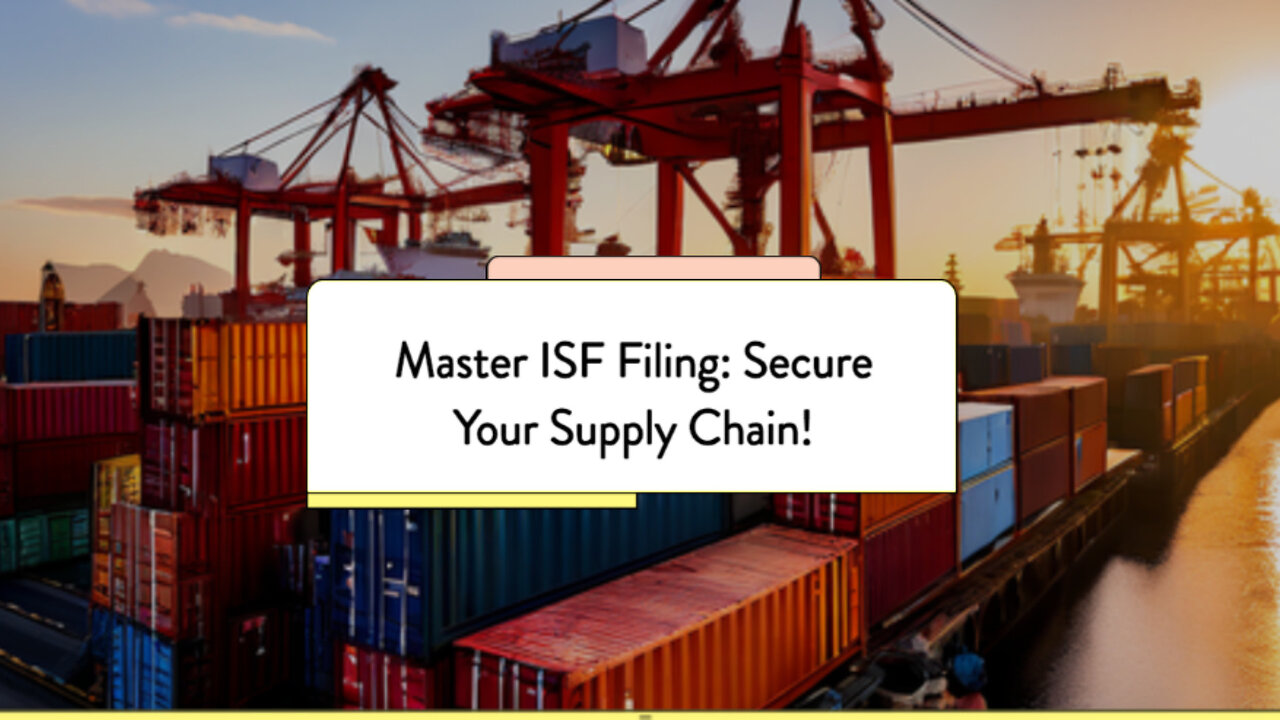Premium Only Content

Mastering ISF Filing: The Key to Supply Chain Security
ISF Depot // 661-246-8217 // [email protected] // www.isfdepot.com
The Importer Security Filing (ISF) is a critical requirement for ensuring the security of the supply chain in international trade. This filing is necessary for most ocean shipments entering the United States and involves submitting specific information to US Customs and Border Protection (CBP) before the goods are loaded onto the vessel at the foreign port. The ISF is typically filed by the importer or their agent, such as a customs broker, at least 24 hours before the shipment is loaded. The required information includes details about the importer, seller, carrier, and the contents of the shipment, such as cargo description, HTS codes, and container stuffing location.
One of the key benefits of ISF filing is that it allows CBP to assess and manage potential risks associated with incoming shipments, enabling them to target high-risk shipments for inspections and prevent the entry of illicit goods into the United States. Importers must understand the importance of timely and accurate ISF filing to maintain compliance. Failure to comply with ISF requirements can result in penalties, monetary fines, and delays in cargo release, negatively impacting an importer's reputation and supply chain efficiency. Working with a skilled customs broker is highly recommended as they can ensure proper ISF filing and compliance.
In addition to ISF filing, customs bonds play a crucial role in international trade. These financial guarantees ensure compliance with CBP regulations and facilitate the smooth flow of goods through the customs process. Importers need to obtain the appropriate customs bond based on the frequency and volume of their imports. Customs brokers also play a vital role in the customs clearance process. They possess extensive knowledge of customs regulations, tariff classifications, and documentation requirements, allowing them to ensure smooth customs clearance, proper ISF filing, and assist with the procurement of customs bonds. By leveraging the expertise of a customs broker, importers can focus on their core business while ensuring compliance with customs regulations.
To summarize, ISF filing is a cornerstone of supply chain security. It allows CBP to effectively manage risks in international trade and prevent the entry of illicit goods into the United States. Importers must comply with ISF requirements to avoid penalties and delays. In conjunction with ISF filing, customs bonds are essential in facilitating the smooth flow of goods through the customs process. Customs brokers play a crucial role in ensuring compliance, proper filing, and procuring the necessary customs bonds.
#usimportbond
#isfcustomsbroker
#uscustomsclearing
#isfentry
Video Disclaimer Here: This tutorial is independent and not affiliated with any US governmental entities.
00:31 - A crucial component of supply chain security
01:27 - Details required for Importer Security Filing (ISF)
02:42 - Hiring a customs broker
04:07 - Conclusion
-
 3:05
3:05
ISF Depot
5 days agoImproving Customs Clearance: The Power of ISF Filing and Customs Brokers
6 -
 LIVE
LIVE
Alex Zedra
2 hours agoLIVE! New Game!
354 watching -
 DVR
DVR
Man in America
9 hours agoEric Trump on Prosecuting TREASON, Civil War & the Battle of Good vs. Evil
9.72K10 -
 LIVE
LIVE
Barry Cunningham
3 hours agoBREAKING NEWS: PRESIDENT TRUMP BROKERS HISTORIC PEACE DEAL IN THE MIDDLE EAST! AND MORE NEWS!
5,868 watching -
 LIVE
LIVE
SpartakusLIVE
5 hours agoThe Boys are BACK || The Duke of NUKE and his Valiant Knights of the Tower of POWER
259 watching -
 1:15:32
1:15:32
Tucker Carlson
2 hours agoICE Protests and Antifa Riots: Tucker Carlson Warns of Total Destruction if America Doesn’t Act Fast
21.8K120 -
 LIVE
LIVE
I_Came_With_Fire_Podcast
10 hours agoChinese Spy GETS OFF | Is Comey's Indictment Selective | Posse Comitatus Dilemma
127 watching -
 LIVE
LIVE
Adam Does Movies
12 hours agoTalking Movies + Ask Me Anything - LIVE
54 watching -
 5:46
5:46
Gun Owners Of America
8 hours agoNew Data Shows Voters Want Pro Gun Politicians
2.68K4 -
 9:22:30
9:22:30
Dr Disrespect
12 hours ago🔴LIVE - DR DISRESPECT - BLACK OPS 7 - BANG BANG BANG
124K5
